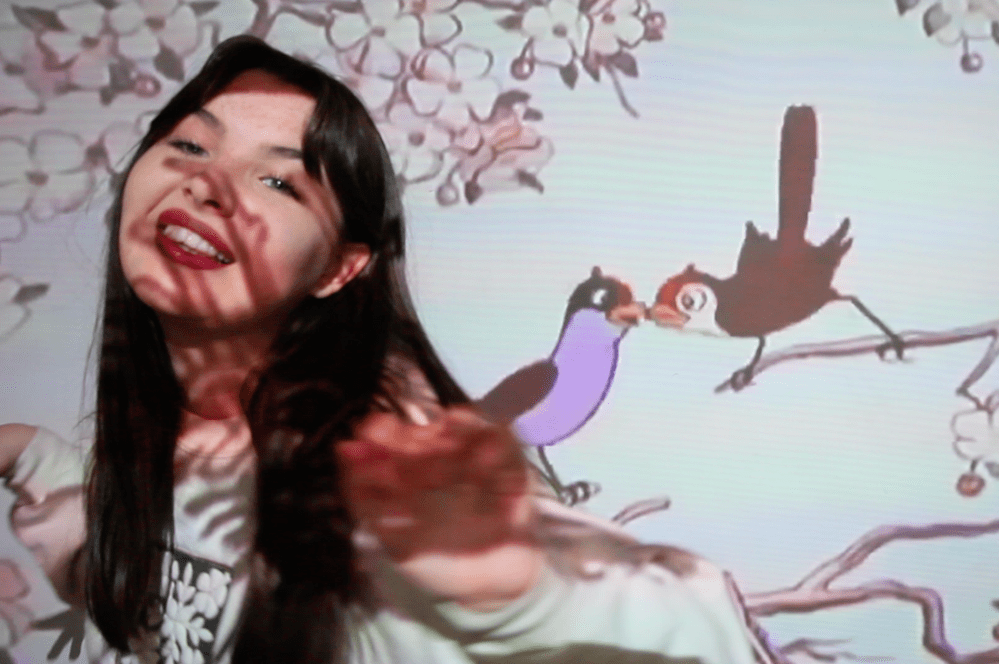

Listening to Margaret Sohn’s virtuosic, inventive guitarwork and incisive lyrics, it’s hard to believe she’s ever doubted her talents. But Imposter, her second EP under the moniker Miss Grit, explores those pervasive feelings of inadequacy as a means of exorcising them, drawing on her experiences as an emerging musician charting genre-defying new territory. It also interrogates social norms from a variety of angles – pressure to fit in, the repetition of the daily grind, arrogance-laced small talk – a dense six songs that never feels like a slog thanks to Sohn’s bold sonic palette.
“I’m definitely an introvert. I think I wrote about social norms a lot on this EP because I started to resent them a good bit – they were really digging into social anxiety and imposter syndrome for me, kind of inflating that in my mind,” Sohn tells Audiofemme. “I was trying to overcome that; the EP was a way to release some of that resentment.”
Sohn grew up in Michigan and started playing guitar in first grade; her father bought she and her sisters a microphone and Cubase software so they could record songs at home. “That was actually my first experience working with a DAW and engineering, at like a really basic level,” Sohn remembers. She headed off to NYU to study music technology – a program that encompasses everything from video game sound design to engineering to electronic composition – though she took a leave of absence around the time she released her debut 4-song EP, Talk Talk, “basically just to focus on music,” she says. She also had a growing interest in building pedals. “That was kind of like, my other dream, I guess. But I started contemplating what a degree from music school would really get me, especially for the price tag,” she adds. “I decided just to take a break and see what I could do in the meantime until I needed to go back.”
Sohn had recorded Talk Talk in a nearly abandoned dorm while the other students were on winter break, but with NME touting it as an “essential listen” upon its release, the bubble in which the project existed had been popped. For Sohn, familiar self-doubt started to creep in. “The Talk Talk EP gave me confidence to keep on writing and gave me the boost to start Impostor, but impostor syndrome is something I have always felt my whole life in everything I do, basically,” Sohn admits. “I think that period of time just highlighted it a lot and made it more present than it’s been in my life. Writing the Impostor EP was kind of a way for me to recognize that it’s there, and be able to identify and put a name to it and try to move on.”
“There’s no more reward for winning/There’s a bigger toll for missing/Reaching out, reaching out for your own hand/But how can you trust where you stand?” she asks on opening track “Don’t Wander” over meditative synth, before the first muscular riffs of “Buy the Banter” interrupt. “If they think you’re somebody/You’ll have to prove you’ve got what they want/And they want,” she warns, in a slow-burning critique of music industry sycophants.
“Not that I wrote this about any specific situation, but I was getting frustrated with certain surface-level conversations, and how music is talked about in different settings and different circumstances,” Sohn says. “I feel like recently, I’ve been getting so many comparisons to St. Vincent, and I can’t help but feel it’s like maybe they just can’t think of another woman-identifying guitarist.” Sohn admits that Annie Clark – and other early-aughts indie acts like LCD Soundsystem – were formative influences, but Miss Grit feels like a different beast altogether, hinging on the build up and release that plays out across each track, while Sohn’s monotone provides bracing commentary. Fuzzed-out effects lend another layer of ’90s alt moodiness – think Elastica, Garbage, and other acts that skirted the line between grunge, industrial, and electronic sounds.
However cool the delivery, Sohn’s minimalist lyrics pack unexpected punch. “Blonde” offers an apathetic glance at the shallowness of conformity (“I’ve got nothing to say,” she repeats), but viewed from her perspective as a half-Korean girl growing up in a predominantly white suburb, it becomes a poignant impression of Sohn’s fatigue at working harder to fit in; expansive reverb illuminates the emptiness of the gulf between herself and her peers.
“[It’s] not that I literally wanted to be blonde, I just had some of those wishes, like, oh I just wanna fit into this white space that I’m surrounded by, I just want to be able to relate to these people and not be seen as an outsider to them,” she explains. “The song ends with ‘I’ve got nothing to say’ because you get to a point where you realize that people will end up seeing you how they want to see you and there’s nothing you can do. Trying to adapt to them isn’t gonna really help change their minds.”
Now, Sohn stands out it another way – her guitar and synth textures truly shine, their interplay communicating turbulent emotions the way a siren singer might belt out an emotional line. “The pushes and pulls, the tensions that build up and the releases, are the most gratifying parts for me. They can be more powerful to me than any lyric or riff. This EP was really focused on [that] energy,” she says, adding that she makes mood boards for each song that include color, fashion, architecture, and photography. “It helps me get into an environment and place the sound to a visual.”
In particular, “Grow Up To” crackles with the electricity of a triumphant guitar melody and booming percussion, which builds and bounces over Miss Grit’s stop-start nursery rhyme: “When I fall dead/I’ll still crave/The next place/All the same/And in the morning/I will wait/’Til it’s late/For my fate/Resuscitate.” Its repetition is meant to resemble being stuck in a rut, while the riffs are always reaching. Release from it comes not in the form of soothing lyrical retort, but jittery distortion that clatters to an abrupt halt. “The song is about never being satisfied, and the guitar is kind of the like tantrum that I have at the end that just collapses and falls off the edge,” Sohn says.
Miss Grit’s sound is so big, it’s hard to imagine Sohn composing music in a Brooklyn apartment, headphones on. She did write Impostor with a live backing band in mind – the album includes bass contributions from Zoltan Sindhu and drumming courtesy Gregory Tock, Sohn’s schoolmates from her NYU program – but the pandemic has provided her with the time and isolation she had when creating Talk Talk as she continues to write. The difference, she says, is that she’s grown as a songwriter.
The album’s final tracks represent that growth best – exuberant early single “Dark Side of the Party” zeroes in on over-confident shmoozers while Sohn wonders why she can’t have it that easy, and the title track closes the album with a note of disbelief: “They’re clapping awfully loud/For no tribulations or trials.” While her words express hesitation and anxiety, there’s no mistaking the unbridled wail of her guitar and the fearless decisions she makes with it.
“I think with anything, there’s a balance – being able to have those insecurities in imposter syndrome is sometimes a good thing, because it can ground you to a certain extent,” Sohn says. “But at the same time, being able to be confident in your decisions and your abilities is definitely helpful.”
On the last minute of the EP, Sohn finally lets all that tension unspool; her guitar settles into quiet strumming over twinkling, dreamy synth. But far from resolving the issues that inspired it, Impostor is really about acceptance. “Imposter syndrome is kind of a ghost that keeps following me around. I can’t always see it or know that it’s there. I think writing the EP and ending with ‘Impostor,’ they’re all just ways to help me see the ghost a little bit better,” Sohn says. “Being able to put a name on certain thoughts and feelings, and understand that some doubts in my abilities might be my imagination, just tied the bow on the box. Now I’m able to leave it and move on to the next thing… the most important part is contextualizing it and realizing how to move on from it, grow from it, shine a different light on it.”
Follow Miss Grit on Facebook and Instagram for ongoing updates.




